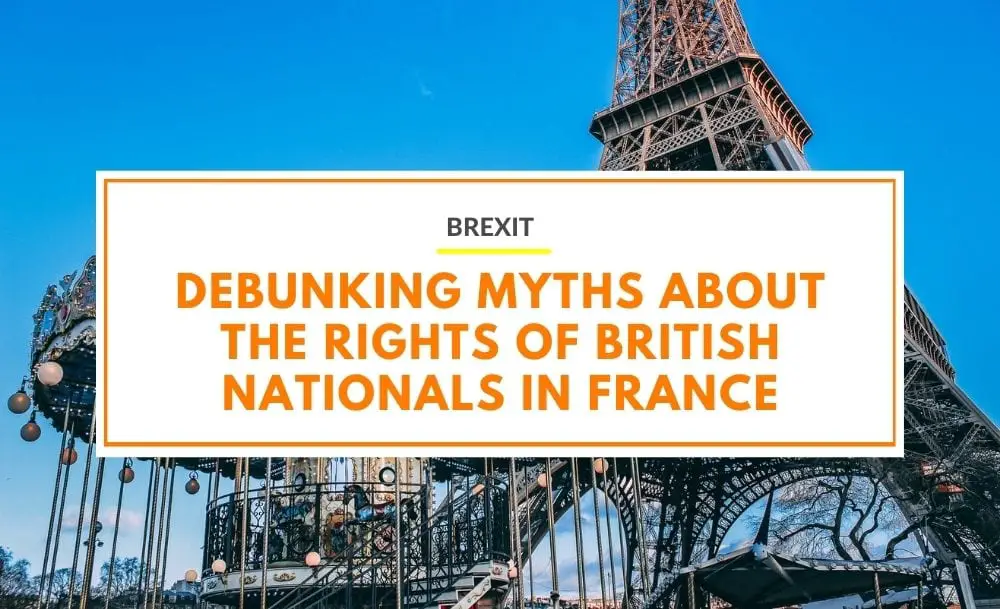Brexit: Debunking Myths About the Rights of British Nationals in France


Leaving the EU has left a lot of confusion on what needs to be done to retain the rights of British nationals in the EU after it was finalised on 1 January 2021.
The post-Brexit situation for British nationals living in or visiting France is complicated, and not helped by a series of persistent rumours, misconceptions, and wrong information.
It is important that we distinguish between facts and myths.
British Nationals Who Lived in France Before 31 December 2020


Applying for Residency
Myth: There is no need for anyone living in France before Brexit or married to a French citizen to apply for residency
Fact: All British nationals who were living in France before 31 December 2020 have to apply for the residency card known as the carte de séjour. Even if you have been in France a long time or are married to a French citizen, you still need to apply for residency.
The only exception to this is British nationals who have dual nationality with an EU country for example France, Spain, Germany etc.
The deadline to make the application is on 30 June 2021.
Myth: If you already have a European Carte de séjour before 2020, you don’t need a new one.
Fact: The Carte de séjour is specific for British nationals covered by the Withdrawal Agreement. Carte de séjour issued before 2020 is no longer valid for British nationals so make sure you have the right card.
Tax Declaration in France
Myth: If you apply for a residency card, you will have to start paying tax in France.
Fact: Virtually everyone who is a permanent resident in France must fill out the annual tax declaration. This is the same rule applied to British residents before Brexit and getting a carte de séjour does not change that.
However, if all your income comes from abroad, like your UK pension, you will pay your tax in the UK and probably not be liable for any tax in France, due to dual taxation agreements between the two countries. However, you must still fill out the form and declare your revenues.


Residence in UK and France
Myth: UK is the main residence and still apply for a carte de séjour.
Fact: The carte de séjour is for people whose main home is in France. Many British nationals with property in France have got used to splitting their time roughly 50/50 between France and the UK, but the British government’s decision to end freedom of movement for its citizens means that people now need to make a decision on which country is their place of residence.
Employment
Myth: Unemployed British nationals can’t apply for residency
Fact: Unemployed British nationals and registered at the Pôle emploi (the French unemployment office) can still apply as a jobseeker for a post-Brexit carte de séjour.
If you have never worked in France you apply as “economically inactive” – the category which includes pensioners. Depending on how long you have been in France, you may need to show some proof of your resources.
Health Insurance
Myth: British nationals need private health insurance before they can apply for a residency card.
Fact: Only people who have been in France for less than 5years and are not working need to supply proof of health cover and it is sufficient to be registered within the French health system, no additional health insurance is required.
This confusion seems to have arisen due to an early mistranslation in the English-language version of the online portal for residency applications. France’s state health insurance system is known as Assurance maladie, and the English-language portal used the literal translation of this – health insurance – which led many British nationals to believe that they needed additional private insurance. In fact, being registered in the French system and having a carte vitale is sufficient.
Income Requirements
Myth: British nationals with only a basic UK pension so probably won’t qualify for residency under the income requirements.
Fact: The majority of British nationals do not have to provide proof of their financial resources except for those who have lived in France for less than 5 years and are not working such as pensioners.
This has probably been the biggest worry for many British nationals, especially as the requirements were not finally clarified until the residency application site went live in October 2020.
The French have lowered some of the standard income requirements and allowed couples to use joint resources to apply. In cases where people are under the income threshold, assets such as mortgage-free property will be taken into account.
A Nightmare to Apply for French Residence
Myth: Applying for residency will be a French bureaucratic nightmare and need to supply a drawer full of documents.
Fact: The Interior Ministry has scaled back the number of supporting documents required and the French government has set up an online portal specifically for British nationals.
French bureaucracy has a bit of a reputation for being slow and cumbersome, but British nationals who have already applied under this system have been struck by its relative simplicity and speed.
British Nationals Moving to France in 2021
So let’s talk about British nationals who do not have French residence but with second home in France or those who do short term work in Europe or those who enjoy lengthy trips to France
Let’s clarify the persistent myths relating to these groups of people.


Second Home Owners
Myth: British nationals who mainly live in the UK but own property in France do not need a visa for stays longer than 90 days in a 180 days cycle.
Fact: Simply owning a property in France does not give you any extra rights when it comes to border controls and immigration rules.
British second-home owners are now covered by the 90-day rule, which limits visits to 90 days in every 180 in the Schengen Zone.
Anyone who wants to stay longer than that without taking up residency needs a visa. The only exception to this is British nationals who have dual nationality with an EU country.
Employment
Myth: British nationals need a work permit for work undertaken in France, even if it’s only for a few weeks.
Fact: Not necessarily. If you intend to work in France without taking up permanent residency such as a freelancer, contractor or taking business trips or cultural tours – you may need a work permit, but there are some sectors that are exempt from the requirement.
If you work for less than 90 days out of every 180 in France then you don’t need a visa, but if you work in multiple countries bear in mind that the 90-day limit applies to the whole EU Bloc, not just France, and each EU country has different visa and work permit requirements.
Driving in France
Myth: British nationals with an International Driver’s Permit don’t need to swap their driving licence for a French one.
Fact: If you are visiting France as a tourist or second-home owner then you can continue to drive with your UK licence and don’t need an International Driver’s Permit.
For residents in France who have a UK licence the situation is more complicated. You will have to swap your licence for a French one by the end of 2021, but at present an impasse on reciprocal agreements to swap licences between the French and British governments mean no applications for a swap are being accepted.
Residents can continue to drive on a UK licence in the meantime, so most people just need to wait and hope an agreement is reached soon. For those with expired UK licence or is about to expire, however, the situation is grim with no immediate resolution in sight, despite pleas and petitions to the British government.
An International Driver’s Permit is not a substitute for a licence, and cannot be used if the licence it is attached to is expired or no longer valid.
Read more: Brexit: Driving Through the EU & What Has Gone Wrong With Brexit So Far
How are you affected by Brexit? Talk to us in the comment section below.
IaM can help with your visa application to the United States, the UK & other countries
If you need help with a US visa, a UK Visa, or visa to Europe, including help with appointment booking obligations, IaM can help. For more information and advice on US immigration, UK immigration law and US visa applications or if you need any help or assistance please, reach out to your Visa Coordinator at IaM.
- Citizenship Demand Soars in Germany - 16 November 2024
- Spain to End Real Estate Route in Golden Visa Program by January 2025 - 15 November 2024
- No ETA Required For French Schoolchildren To Visit UK - 14 November 2024









